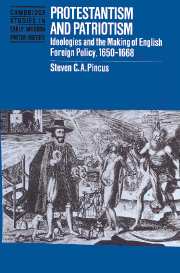Book contents
- Frontmatter
- Contents
- Acknowledgments
- List of abbreviations
- 1 Introduction
- Part I The rod of the Lord: ideology and the outbreak of the First Anglo-Dutch War
- Part II To unite against the common enemy: the 1654 Treaty of Westminster and the end of apocalyptic foreign policy
- Part III Popery, trade, and universal monarchy: ideology and the outbreak of the Second Anglo-Dutch War
- Part IV The Medway, Breda, and the Triple Alliance: the collapse of Anglican Royalist Foreign Policy
- 17 Historiographical overview
- 18 The circulation of news and the course of the war
- 19 The popular understanding of the war
- 20 The government's war aims
- 21 An Orangist revolution
- 22 Victory denied and wartime consensus shattered
- 23 The rise of political opposition
- 24 The road to Chatham: the decision not to send out a battle fleet
- 25 The demise of Anglican Royalist foreign policy
- Conclusion
- Bibliography
- Index
- Titles in the series
22 - Victory denied and wartime consensus shattered
Published online by Cambridge University Press: 01 October 2009
- Frontmatter
- Contents
- Acknowledgments
- List of abbreviations
- 1 Introduction
- Part I The rod of the Lord: ideology and the outbreak of the First Anglo-Dutch War
- Part II To unite against the common enemy: the 1654 Treaty of Westminster and the end of apocalyptic foreign policy
- Part III Popery, trade, and universal monarchy: ideology and the outbreak of the Second Anglo-Dutch War
- Part IV The Medway, Breda, and the Triple Alliance: the collapse of Anglican Royalist Foreign Policy
- 17 Historiographical overview
- 18 The circulation of news and the course of the war
- 19 The popular understanding of the war
- 20 The government's war aims
- 21 An Orangist revolution
- 22 Victory denied and wartime consensus shattered
- 23 The rise of political opposition
- 24 The road to Chatham: the decision not to send out a battle fleet
- 25 The demise of Anglican Royalist foreign policy
- Conclusion
- Bibliography
- Index
- Titles in the series
Summary
The clinching English victory never came. Instead of bonfires lighting English celebrations, and great guns informing the countryside of English victories the following summer brought with it the flames of English men-of-war fired in the Medway by the Dutch navy and the sounds of Dutch guns bombarding the English coast. What had happened? Why did the English, who had seemed to be on the threshold of a total victory over the Dutch and their allies in the autumn of 1666, suffer such an ignominious defeat at the hands of the Dutch republican leader John De Witt the following summer?
At the exact moment in which English hopes for victory were being widely expressed, they received a damaging blow in the Netherlands. In early August 1666 the English government's chief Orangist agent, the Sieur de Buat, mistakenly delivered to John De Witt a letter from Arlington which “enlightened” De Witt as to “the design of promoting the sovereignty of the Prince of Orange, and of the constraining of the States to conclude a peace to the betraying of their liberties.” Buat was quickly incarcerated, brought to trial and ultimately beheaded for his treason. At his trial, Buat claimed – and the States General did everything to publicize Buat's statements in his own defense – that “what he did was with a good intention,” an intention to “make the King of England the greatest monarch in the world.”
- Type
- Chapter
- Information
- Protestantism and PatriotismIdeologies and the Making of English Foreign Policy, 1650–1668, pp. 343 - 368Publisher: Cambridge University PressPrint publication year: 1996

